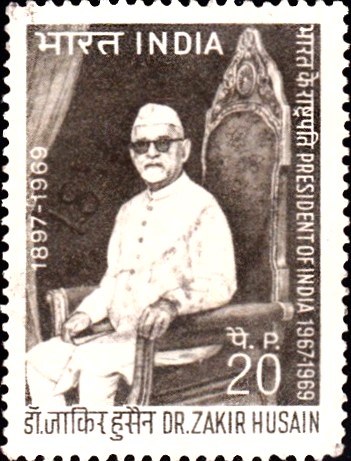
Zakir Hussain Khan
A commemorative postage stamp on Dr. Zakir Husain, 3rd President of India (1967-69):
 Issued by India
Issued by India
Issued on Jun 11, 1969
Issued for : “Among the galaxy of luminous stars that have shed their radiance on the firmament of our national life, Dr. Zakir Husain occupies a pride of place. Moulded in the great traditions set before us by the Father of the Nation, Mahatma Gandhi, Zakir Saheb was the embodiment of all-pervading humanism. In him, the nation found a true and living symbol of our composite culture. He adorned many a position with distinction, dignity and decorum. The stamp of his magnetic personality was indelibly impressed in every position he occupied. His quest for excellence has few parallels in human history.
The commemorative stamp that is being brought out to coincide with the Chehlum ceremony of the late Dr. Zakir Husain is but a token tribute of the regard and respect that we have for this great personage. I am sure his memory will remain ever green in the hearts of our people for generations to come. Zakir Saheb‘s noble example will inspire the nation to fulfil the tasks – solidarity and secularism – which were so dear to his heart and to which he dedicated himself. It is now up to us to translate his ideals into reality so that we can make India occupy a premier position in the comity of nation.” – V. V. Giri, Rashtrapati Bhavan, New Delhi-4.
“Dr. Zakir Husain represented the best in our national culture and in the world’s heritage of civilisation. In him, the intellectual, the aesthetic and the practical blended harmoniously. Rare indeed are individuals in whom thought, speech and action are so fully integrated. Distinguished and poised, he chose the profession of a teacher and throughout his life he taught us greater sensitivity, greater devotion to ideals and to selfless work. The nation mourns a great President and a great representative of the true spirit of India.” – Indira Gandhi, Prime Minister, New Delhi, May 14, 1969.
“In issuing a special commemorative postage stamp in honour of the late Dr. Zakir Husain, the third President of the Indian Republic, the Posts and Telegraphs Department offer its humble homage and tribute to a great patriot, an eminent educationist and an erudite scholar. He symbolised the best traditions of our composite Indian culture and served the Nation with an outstanding sense of dedication to duty for nearly half a century. As the President, he had exemplified in himself our conception of a secular democracy in a very worthy manner. His keen devotion to scholastic and cultural pursuits gave a new meaning to the concept of service to the cause of education. His association with the Jamia Milia, the Aligarh Muslim University and numerous other educational and other institutions marked an era of service to the cause of education in this country.
He has been a shining example of erudition, dignity, nobility and humility. In his sudden demise the Nation has lost a leader of high intellectual and moral eminence. May his memory remain ever green with us as an example of lofty ideals and gentle behaviour.” – Satya Narayan Sinha, Ministry of Communications and Information & Broadcasting, India, New Delhi, 19th May, 1969.
Design : Photo on the stamp – by courtesy of Shri T. Kasinath, Director, Photo Division, Ministry of I. & B., Govt. of India, New Delhi.
Type : Stamp, Postal Used
Colour : Raw Sienna
Denomination : 20 Paise
Overall Size : 3.91 x 2.90 cms.
Printing Size : 3.63 x 2.62 cms.
Perforation : 13 x 13
Paper : unwatermarked paper
Number Printed : 30,00,000
Number per issue sheet : 35
Printing Process : Photogravure
Designed and Printed at : India Security Press
Name : Zakir Husain
Born on Feb 8, 1897 at Hyderabad, Hyderabad State, British India [now in Telangana]
Died on May 3, 1969 at New Delhi, India
About :
- At eleven-twenty hours on the morning of Saturday May 3, 1969, death came suddenly to Dr. Zakir Husain, third President of the Republic of India. An eminent educationist and thinker, he symbolised the best traditions of Indian culture and served the nation with exemplary dedication for nearly fifty years.
- Zakir Husain was born on February 8, 1897, in Hyderabad where his father had migrated from Uttar Pradesh. Losing his father at an early age, he returned to his ancestral home. After studying at the Islamia High School, Etawah, he went for higher education to the Mohamedan Anglo-Oriental College (now Aligarh Muslim University). He was known even in those days for his love of knowledge, his wit and eloquence and his readiness to help his fellow-students. His record at college was brilliant not only in academic achievement but also in extra-curricular activities.
- The turning point in his life came in October 1920 when Mahatma Gandhi, accompanied by the Ali brothers, visited Aligarh to explain his doctrine of Satyagraha and the need to boycott educational institutions controlled by the British Government. Zakir Husain, then only 23 and a student of the M.A. class, was among the small group of students and teachers who were so profoundly moved that they decided to establish a National Muslim University by the name Jamia Milia Islamia. Recounting, years later, the impact of Mahatma Gandhi, Dr. Zakir Husain said : “I began my public career at the feet of Gandhiji, and he has been my guide and inspirer.” He summed up Gandhiji‘s teachings and his own ideal in these words: to lead a pure life, individual and social; to insist on the means being as pure as the end; to have an active and sustained sympathy for the weak and the down-trodden; to forge unity among the diverse sections of the Indian people. And Dr. Zakir Husain‘s life was the very embodiment of these ideals.
- Zakir Husain‘s unceasing quest of knowledge took him to Germany in the twenties. During his three years’ stay there, he acquired a deep love for European art, literature and music. The University of Berlin conferred upon him a doctorate for his work in Economics, the subject of his special study. Even while absorbed in his scholastic and cultural pursuits. Dr. Zakir Husain was untiring in expounding the meaning of India‘s fight for freedom under Gandhiji’s leadership.
- Returning to India in 1926 he became, at the young age of 29, the Vice-Chancellor of Jamia, which had moved to Delhi. He held the position for two decades. He and his colleagues took a vow of simplicity to ensure that the University’s finances were not strained. Dr. Zakir Husain‘s inspiration and leadership made the Jamia into one of the leading institutions of its kind in the country.
- In 1937 Mahatma Gandhi invited him to head the National Committee on Basic Education to evolve a system of education suited to the needs and genius of a country where the overwhelming majority lived in the villages. The Jamia itself became a pioneering centre of educational experiments. Dr. Zakir Husain remained President of the Hindustani Talimi Sangh until 1950. He wrote extensively. Among his books are an Urdu translation of Plato‘s Republic, a critique of Capitalism, translations of several works on economics and education, and books for children.
- Dr. Zakir Husain refrained from active politics so as to be able to give his all to his University. In 1948 he took up the Vice-Chancellorship of the Aligarh Muslim University at the insistence of Maulana Abul Kalam Azad. He infused a new outlook in the University during his stewardship of eight years. He was also called upon to serve on a number of educational and other committees and commissions including the University Education Commission and the Press Commission.
- Dr. Zakir Husain was nominated to the Rajya Sabha in 1952 as a distinguished savant. He was re-nominated in 1956. In 1957, he was appointed Governor of Bihar, an office he held until 1962. He continued to serve the cause of education and culture within the country and abroad in many ways. He represented India in UNESCO, and served as a member of its Executive Board during the years 1956-58. He travelled and lectured widely in Europe and America, propounding his ideas on education. He once defined a University as “primarily a community of scholars and students who should be treated as responsible members of a free and academic society, free to think, free to express their thoughts, free to refuse to conform, free to be unorthodox and even free to err.” This broad vision inspired his work as an educationist throughout his life.
- He was elected Vice-President of the Republic, in 1962. As ex–officio Chairman of the Rajya Sabha he won the respect of the House through his erudition, impartiality and gentleness. He visited many countries of Asia, Africa and the West. In 1963 he was awarded the highest honour of the land, the Bharat Ratna for his great services to the nation.
- After serving as Vice-President for a term of five years Dr. Zakir Husain was elected President of the Republic in May, 1967. In his deeply moving inaugural speech he said that the whole of India was his home and all its people were his family. His wisdom and healing touch were of immense value to the nation during periods of stress and strain. His vision and adherence to principles, his grace and dignity, his high aesthetic sensibility, his understanding and compassion added a new lustre to the high office he held, and earned for him the affection and admiration of all sections of the people.
- Death has taken away this great patriot, scholar and humanist. The country loses a person of great intellectual and moral eminence who embodied man’s heritage of nobility, goodness and truth.
- Notification by Nagendra Singh, Secy. to the President, President’s Secretariat, New Delhi, the 5th May 1969.


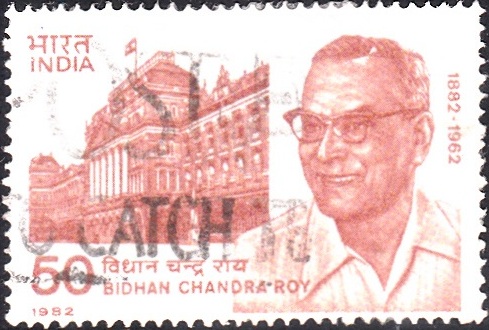
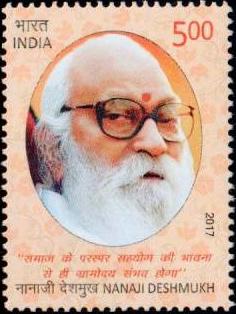
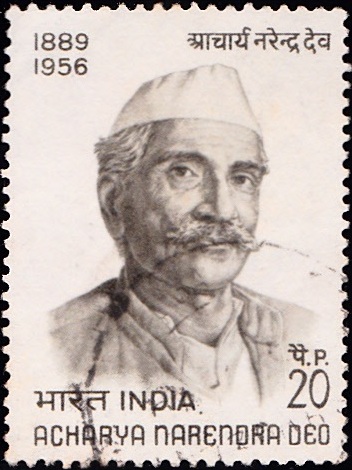
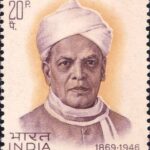

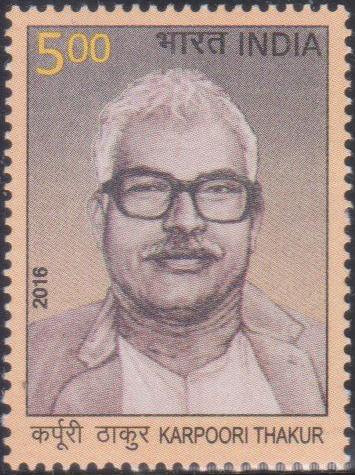
[…] of the Spastic Society of India. The FDC design shows her receiving an award from President Zakir Hussain and the Cancellation design depicts the classic still from the film ‘Mother […]
[…] “I am happy to know that the Posts and Telegraphs Department is issuing a special postage stamp in commemoration of the forthcoming birthday of Shreemati Sarojini Naidu. In the history of the country’s struggle for freedom her name will always occupy an honoured place. Born in a rich and aristocratic family and blessed with the best that Western education could confer, she threw herself into the Congress movement regardless of the hardships and sufferings which could daunt even the hardiest of men. She utilized all her poetic and literary talents in promoting the country’s cause both at home and abroad, and while enduring the hardships and privations which fell to the lot of fighters for freedom, she retained her characteristically fresh and vivid approach to life. This helped to bring cheer to the lives of many others who are not so fortunately endowed. In honouring the memory of this great woman – one of the greatest that our country has produced, let us remind ourselves of the values which she prized – love of peace, freedom and justice and complete faith in racial and communal harmony and human brotherhood.“ – Zakir Husain […]
[…] First Triennale was inaugurated at New Delhi by the President of India, Dr. Zakir Hussain on the 10th February, 1968. It was on view till the 31st of March, 1968. The exhibits for the […]